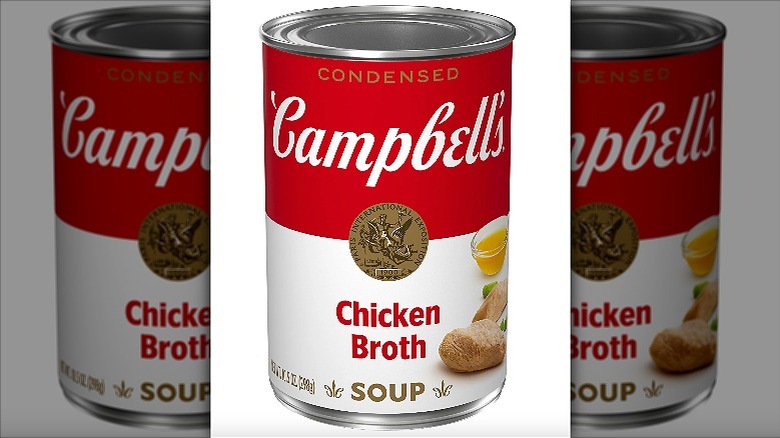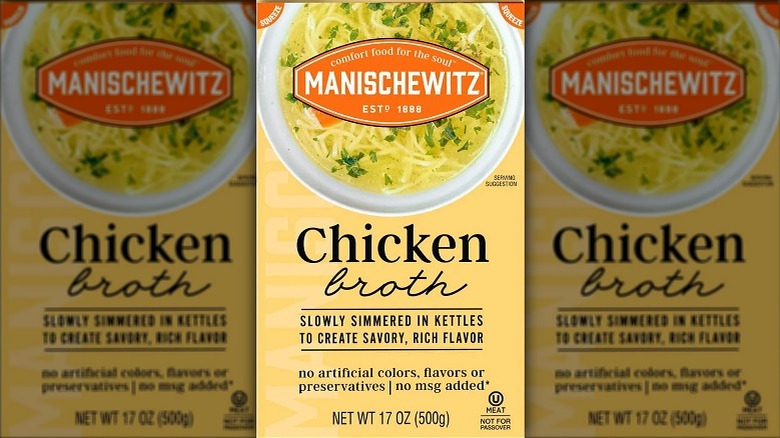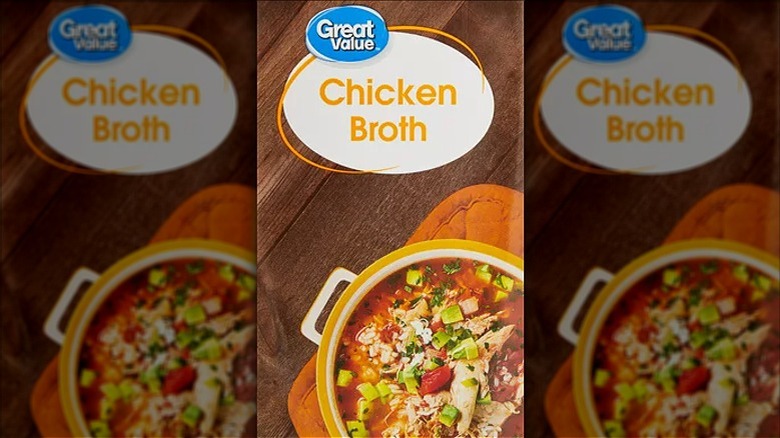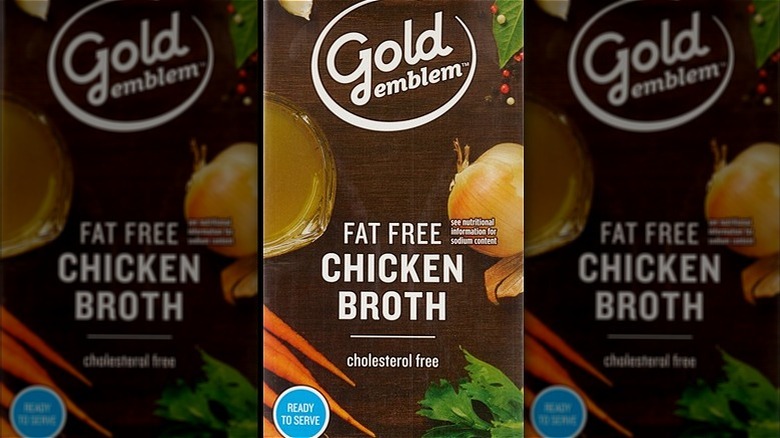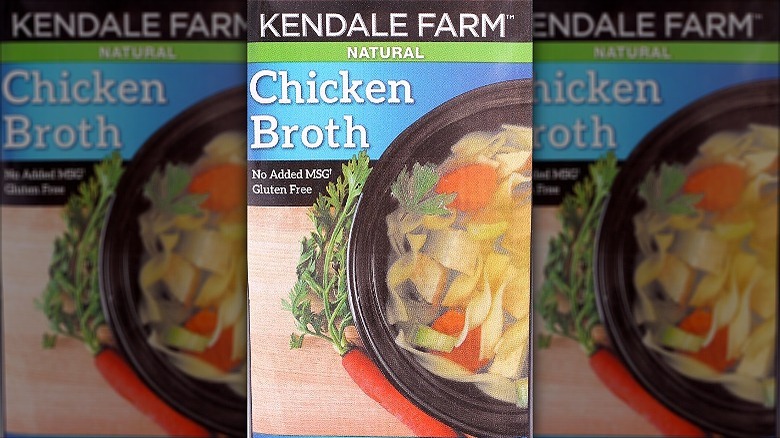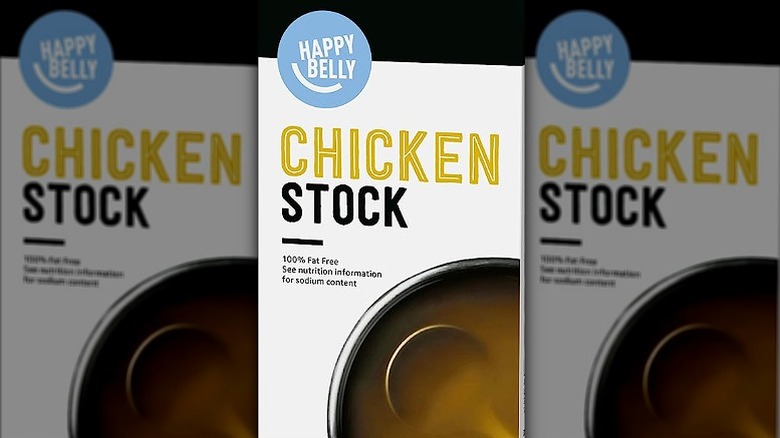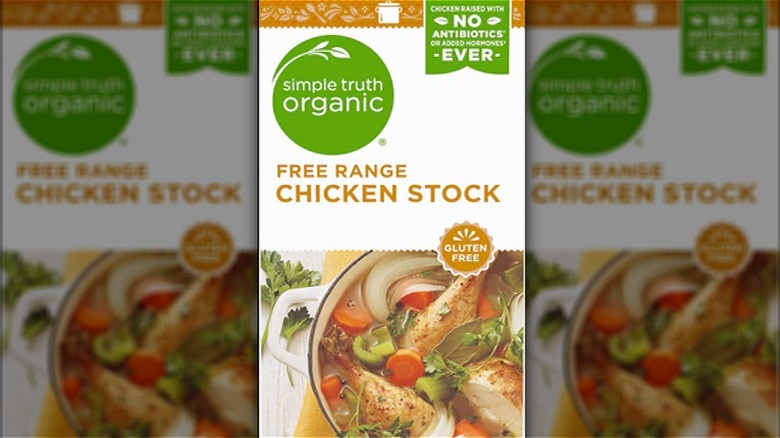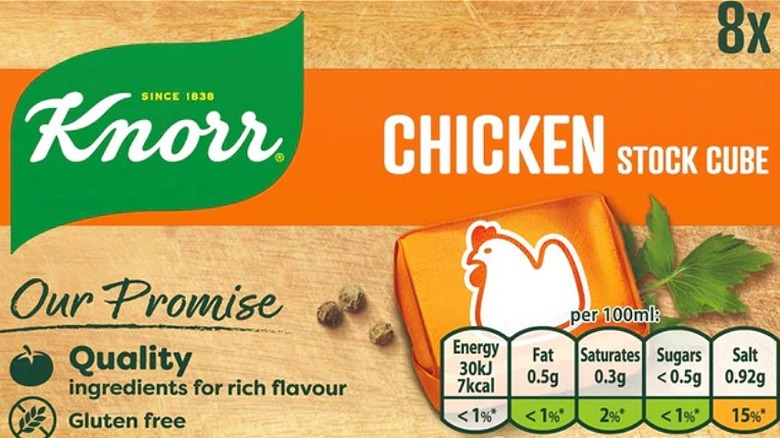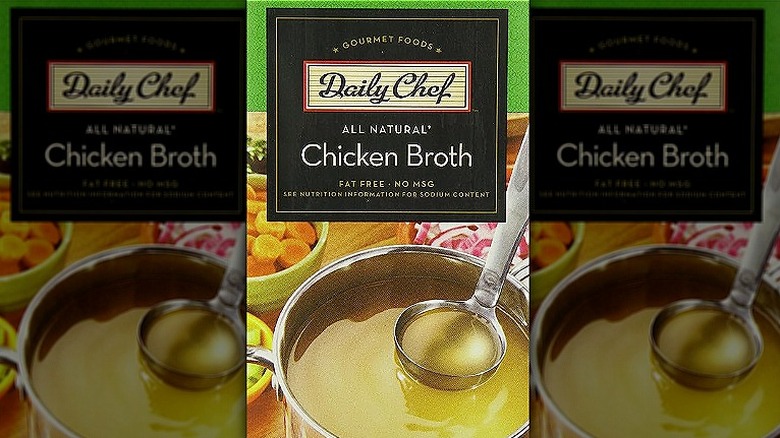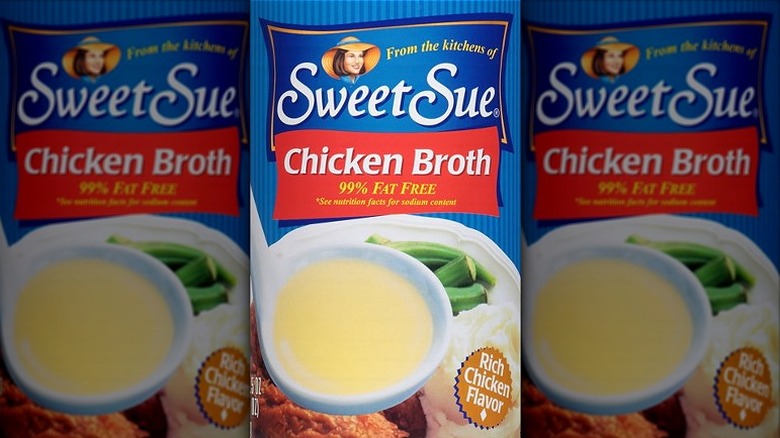The 11 Unhealthiest Store-Bought Chicken Stocks And Broths
We may receive a commission on purchases made from links.
Store-bought chicken stock or broth is one of the most convenient staples to keep on hand. They are quick, easy, affordable, and many have a convincingly homemade flavor that can produce a good soup, stew, or sauce. That said, not all stocks and broths are identical in nutritional value.
For this list, we treat stocks and broths as interchangeable, even though they are traditionally made differently. Homemade broths are produced by boiling meaty bones, vegetables, and herbs in water for approximately an hour before getting strained. Homemade stocks typically use roasted meat bones that simmer in water for hours until the bone marrow and collagen are rendered out, creating a more gelatinous and nutrient-rich liquid. Where store-bought stock or broth is concerned, there is no legal distinction made between the two by the USDA or the FDA, so you can use either for a recipe.
When hunting for the healthiest stock or broth to put in your pantry, primary considerations include the quality of ingredients used, sugar content, additives like preservatives and artificial flavorings, and, most importantly, sodium content. This is where most store-bought stocks and broths fail. According to the U.S. Food and Drug Administration, the recommended daily value for sodium should be less than 2,300 milligrams. A food item with a percentage of the daily value (%DV) per serving of 20% DV or above is too high. For this reason, you should always seek out low-sodium store-bought stock or broth options. Based on these criteria, these are the unhealthiest store-bought stocks and broths on the market.
1. Campbell's Condensed Chicken Broth
Founded in 1869, Campbell's Soup Company has had a long history of producing well-liked and affordable canned soups. While its condensed chicken broth is budget-friendly, it does have some issues in the nutrition department. With 3 grams of fat and 1 gram of saturated fat per half-cup serving, it has more fat than any other broth we researched. What is more concerning is the sodium content of this broth, which is 750 milligrams per serving, a whopping 33% DV, which is exceedingly high.
We also have questions regarding the quality of the ingredients in this stock. While virtually all store-bought stocks and broths begin with a concentrated stock base to which water and other items are added to achieve the desired flavor for a particular brand, some are better than others. This broth obtains most of its chicken flavor from chicken fat and dried chicken. And its relatively meager protein content is supplemented with soy protein concentrate.
As far as flavor is concerned, most of its savoriness comes from supplementation with yeast extract and monosodium glutamate (MSG). Though Healthline indicates that research is inconclusive, many individuals experience sensitivity to MSG, which can cause symptoms such as fatigue, headache, skin flushing, elevated heart rate, and numbness or tingling of extremities. And finally, this stock has allergen warnings for those with soy and wheat allergies. As such, we would walk past this can of broth on the grocery aisle.
2. Manischewitz Chicken Broth
The Manischewitz brand has been a reliable staple for Kosher food serving the Jewish community since 1888, when Rabbi Dov Behr Manischewitz opened a modest matzo bakery in Cincinnati, Ohio. While the front of the box of Manischewitz chicken broth conjures images of grandma laboring for hours over a healthy and delicious kettle of matzo ball soup made from wholesome ingredients, the nutrition label somewhat betrays this image.
At first glance, we were astonished by the whopping 700 milligrams of sodium per one-cup serving, which is 30% DV. We also noticed trace amounts of fat and added sugar. In fact, there is as much sugar as there is protein in this broth. The primary ingredient in this broth is water, which will help offset the amount of salt you consume but lacks much nutritional value. Like other stocks, the second ingredient is a chicken flavor concentrate made of chicken and more water.
Additional flavorings include yeast extract for that umami flavor to offset any lack of chickeny goodness, chicken fat or schmaltz in Yiddish, potato flour as a thickener, some vegetables, two kinds of oil, and sugar. And salt is listed twice in the ingredients, once after chicken fat and once at the end as sea salt. There is also a note in the fine print regarding a small amount of naturally occurring glutamate due to yeast extract, which may cause adverse reactions in some populations. Bottom line: This is a box of salty water with a hint of chicken flavor.
3. Great Value Chicken Broth
The Walmart Great Value brand prides itself on manufacturing high-quality alternatives to brand-name items that are more affordable. Compared with some of the other well-known brands, we can't say that this chicken broth is much more unhealthy, even though it does have an excessive amount of salt at 830 milligrams of sodium per one-cup serving which is 36% DV.
As far as ingredients are concerned, this starts with a base of chicken broth. There are also two entries for salt — salt and sea salt — which would explain the heart-stopping amount of sodium. Much of the remaining flavor is incorporated from yeast extract, natural flavors, carrot juice concentrate, onion juice concentrate, celery juice concentrate, chicken fat, and some chicken meat solids.
If you choose the Great Value brand, we recommend the low-sodium chicken broth, which at 530 milligrams of sodium per one-cup serving is a marked improvement, though, at 23% DV, this would still be considered high in salt by FDA standards for sodium intake.
4. CVS Gold Emblem Chicken Broth
If we are honest, we were surprised to find that a pharmacy chain like CVS Health, which began as a Consumer Value Store in 1963 in Lowell, Massachusetts, had its own brand of chicken broth. Its Gold Emblem chicken broth is not what we expect from a pharmacy promoting health and wellness. Its sodium level alone is enough to make one pause. At 860 milligrams or 37% DV per one cup serving, this is one of the higher sodium levels of the brands we reviewed. Ironically, the sodium content is clearly mentioned on the front of the box of broth, which seems like something you wouldn't want to advertise quite so blatantly.
The ingredients note two kinds of salt, with salt and sea salt being the second and third ingredients on the label after chicken broth. And the only evidence of chicken beyond the broth concentrate is chicken fat and chicken powder. There is also added sugar, making its sugar content the same as its protein content. Additional flavor is provided by yeast extract, onion powder, carrot juice concentrate, and natural flavors. All in all, this broth seems to be a lot of salty pseudo-chicken flavored juice.
5. Savory Choice Chicken Broth Concentrate
The Savory Choice chicken broth concentrate is a unique brand. It is a 12-gram pouch that gets reconstituted with one cup of hot water, presumably similar to what other stock and broth brands use as the base for their proprietary blends. The brand is part of the parent company Kettle Cuisine, a corporation dedicated to producing high-quality, safe, consistent, artisanal products at scale for distribution throughout the food service industry. With words like "artisanal," "clean," "scratch-made," and "health-conscious" all over its website, we expected slightly higher nutritional standards from this product.
It has trace amounts of fat and more sugar than the other brands of stock or broth we noted. It also boasts 770 milligrams of sodium per packet, or 33% DV, which cannot be classified as health-conscious. Additionally, one of the primary ingredients in this product is maltodextrin, an additive frequently used to help improve flavor, provide smoother texture, and extend shelf-life.
Though generally recognized as safe for use by the U.S. Food and Drug Administration, Medical News Today notes some areas of concern regarding potential health risks. Maltodextrin has a very high glycemic index, which can cause steep spikes in blood sugar levels that may be problematic for those with type 2 diabetes. It can also exacerbate gastrointestinal distress in those with Crohn's Disease. And it can be contraindicated for those with food allergies, as it can be obtained from wheat, meaning trace amounts of gluten may be found.
6. Kendale Farm Natural Chicken Broth
The chicken broth brand retailed by Dollar General stores is from Kendale Farm. While we attempted to locate the manufacturer of this broth, we did not find a corporate headquarters, which left us a bit dubious about its origins and quality. At first glance, the thing that stands out is its 890 milligrams of sodium per one-cup serving. At 39% DV, this is obscenely high. Its primary ingredient is filtered water supplemented by a chicken broth base. The term "natural flavors” appears on the ingredient list three times, which makes us wonder what those natural flavors are. And not unsurprisingly, salt appears on the ingredients list twice, once in the middle as salt and once at the end as sea salt.
Another ingredient of concern is dextrose, a sugar virtually indistinguishable from glucose sourced from corn or wheat, per WebMD. Though generally considered safe to consume, dextrose may be contraindicated for those with type 2 diabetes due to its high glycemic index. It can also lead to allergy symptoms like rashes, nausea, difficulty breathing, and stomach pain when consumed in high quantities. Finally, it is not recommended for those with corn allergies. Because this product notes it is gluten-free, dextrose was presumably obtained from corn versus wheat. That said, sodium levels alone would have us running in the opposite direction of this chicken broth.
7. Happy Belly Chicken Stock
Like most other major retailers, Amazon has branched out its offerings by developing its distinct discount brand of products named Happy Belly. While this brand is certainly not the most unhealthy of the chicken stocks and broths we have investigated, we would still list it as subpar nutritionally thanks to its higher-than-recommended sodium level, which at 540 milligrams per one-cup serving is 23% DV. It also has 15 milligrams of cholesterol and added sugars.
Yet again, the primary ingredient is chicken stock, indicating a reconstituted base. Beyond the stock base, there is no other indication of chicken anywhere else on the ingredients list. Dextrose or sugar is the second ingredient listed, which, as already noted, may be contraindicated for those with corn allergies or type 2 diabetes. And yet again, salt is listed twice on the ingredients, initially as sea salt as the third ingredient and then as salt near the end of the ingredients list. A number of the reviews of this stock remark that the lack of chicken flavor was noticeable. Some words used to describe this product include "bland" and "flavorless," reflecting the notable absence of chicken on the ingredients list.
8. Simple Truth Organic Chicken Stock
On the face of it, the Kroger grocery store brand known as Simple Truth Organic has a relatively decent chicken stock. It is considered organic, gluten-free, non-GMO, and made with chicken raised without antibiotics or added hormones. All of this is great, although according to the USDA, the use of hormones in raising poultry is strictly prohibited, so including this on the label is somewhat misleading. Additionally, stating the meat is non-GMO is also redundant, as all meat raised per USDA organic regulations already restricts the use of bioengineered feed.
Where nutrition is concerned, this stock contains 400 milligrams of sodium which is just shy of what is considered high at 18% DV. And its ingredients seem favorable, except for the use of mechanically separated chicken. Though the USDA considers mechanically separated poultry safe for human consumption, there are some concerns regarding the nutritional value of this chicken, which is made up of all the parts of the chicken that would otherwise get discarded once an animal is slaughtered and processed, like the bones, skin, and any meat still attached to the bones.
Once this gets extruded through a high-pressure mechanical sieve, the resulting paste can be high in fat and connective tissue. There are also some questions regarding the safety of this meat due to potential cross-contamination making it more susceptible to contracting bacteria like salmonella and E-coli. This may be more of a buyer-beware situation rather than a blatant health concern, but it is something to note.
9. Knorr Chicken Stock Cube
Knorr is a British brand, which makes comparing its nutritional value to American brands a little complicated. For this reason, we referenced dietary recommendations for the U.K. that indicate a sodium content of more than 0.6 grams per 100 gram serving as high. The Knorr Chicken Stock Cubes, which are reconstituted in 100 milliliters of water, just under half a cup, come in at 0.92 grams of sodium per serving, which is exceedingly high.
Additional considerations include the presence of palm oil, which is high in saturated fat and is one of the oils most frequently associated with the deforestation of rainforests in Indonesia and Malaysia, making it environmentally dubious. This product also contains maltodextrin, which though generally considered safe to consume, is contraindicated for those with celiac disease because it is often manufactured from wheat, per WebMD. It also has a high glycemic index making it potentially risky for those with type 2 diabetes. And finally, maltodextrin purportedly has been linked to the development of gastrointestinal distress associated with sensitivities and the disruption of the good bacteria in your gut. In short, we might skip this product even though it is highly cost-effective and convenient.
10. Daily Chef All Natural Chicken Broth
Daily Chef All Natural Chicken Broth is manufactured under the Sam's Club Member's Mark proprietary brand. This broth brand also exceeds the recommended daily value of sodium with 700 milligrams per one-cup serving, which is 29% DV. The primary ingredient in this broth is purified water. It also contains chicken broth and vegetable stock base, making it unique to all the other brands. The one item on the ingredients list that frankly chaps our hide is granulated cane juice. Granulated cane juice is basically the same thing as sugar without the added step of dehydrating it into crystals, which results in a slightly greater retention of the nutrient riboflavin. Otherwise, cane juice is sugar, and its use on a label is potentially misleading to consumers.
The other wording we find deceptive is the voluntary labeling regarding potential cross-contamination with milk, tree nuts, wheat, and soy. Rather than saying this product may contain these allergens, it notes that this item is manufactured in a facility that also processed these allergens, but that good manufacturing processes are used to segregate these ingredients. This wording makes it ambiguous, and if you are allergic to these allergens, you should probably avoid using this product.
11. Sweet Sue Chicken Broth
While we discovered the Sweet Sue brand of chicken broth at a Kroger grocery store, it can be found for sale from several retailers. The Sweet Sue brand is also known for its canned and vacuum-sealed chicken, making its foray into stock unsurprising. Unfortunately, its stock isn't something to get overly excited about. It boasts an unnerving 870 milligrams of sodium per one-cup serving, which is 38% DV.
It also contains monosodium glutamate, which, as we have already established, may be problematic for some populations. Its ingredients list is rounded out with sugar, chicken fat, hydrolyzed soy protein, caramel color, and silicon dioxide, generally used as an anti-caking agent. In addition to the numerous flavor additives present in this product, it also comes with a soy allergen warning. The bottom line: Given the high sodium and number of ingredients that may produce gastrointestinal distress, we would skip this broth too.

